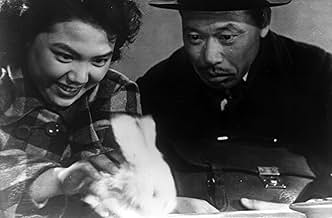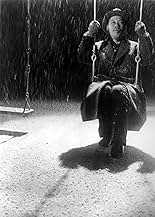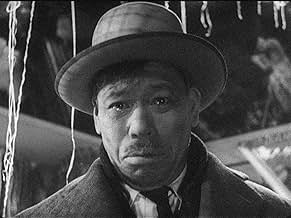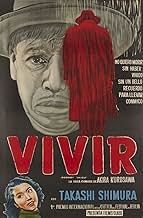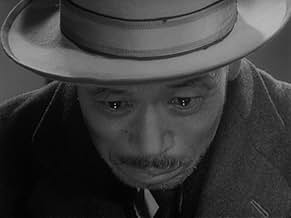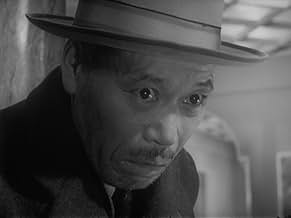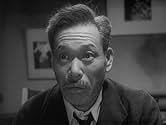A bureaucrat tries to find meaning in his life after he discovers he has terminal cancer.A bureaucrat tries to find meaning in his life after he discovers he has terminal cancer.A bureaucrat tries to find meaning in his life after he discovers he has terminal cancer.
- Director
- Writers
- Stars
- Nominated for 1 BAFTA Award
- 6 wins & 2 nominations total
- Director
- Writers
- All cast & crew
- Production, box office & more at IMDbPro
Featured reviews
I too have seen all the Samurai films. It was gratifying to watch this tender little film. How would we act if we knew when the end was coming? There are so many terrifying and tender moments in this film. The scenes with the young office mate went from charming to cold-- we knew there was no more than companionship, but she can't really even give him that anymore. The scene when he is about to tell his son about his condition and the young man goes off on a rant about how embarrassingly his father has been acting actually brought me to tears. Of course, it's the price he pays for his cold distance all those years. Then there's the whole bureaucratic nightmare of the office. Even at the wake they don't want to give credit. All the buck passers want a share of his legacy. Maybe families who are living on the edge should watch this movie. Even after more than 50 years, it wears extremely well.
Kanji Watanabi is a quiet, melancholy man who has spent all his life behind his office desk doing sweet eff-all. When he is diagnosed with stomach cancer he realizes that he has been petty much dead his whole life, and searches desperately for away to live again.
This is Akira Kurosawa's masterpiece, yes, even better than Rashomon and The Seven Samauri. It is a perfect true story of everybody's life- how we don't even realize we have it until we know it will be over in a short while. Watanabi's quest for self-discovery is one of the greatest from any motion picture ever made. The all-too-true paradox is one to end all paradoxes- that Watanabi is dead, and had been all his life, until he realized he was sick, which is when he began living for the first time. Takashi Shimura, the actor best known for his role as the wise, bald-headed Samauri in The Seven Samauri, and the professor out of the early Godzilla films, plays Watanabi perfectly- in my mind, it's one of the greatest film performances of all time.
Not everyone will love this movie. It was made a long time ago, the main character is an old fogey, it has subtitles, and it's pretty long. Many people today, especially young kids, would find it boring. Well, let 'em. There's no need to worry about them, they'll always have Pirates of the Carribbean, they'll always have The Matrix. Leave Ikiru and films like it to the true lovers of cinema.
This is Akira Kurosawa's masterpiece, yes, even better than Rashomon and The Seven Samauri. It is a perfect true story of everybody's life- how we don't even realize we have it until we know it will be over in a short while. Watanabi's quest for self-discovery is one of the greatest from any motion picture ever made. The all-too-true paradox is one to end all paradoxes- that Watanabi is dead, and had been all his life, until he realized he was sick, which is when he began living for the first time. Takashi Shimura, the actor best known for his role as the wise, bald-headed Samauri in The Seven Samauri, and the professor out of the early Godzilla films, plays Watanabi perfectly- in my mind, it's one of the greatest film performances of all time.
Not everyone will love this movie. It was made a long time ago, the main character is an old fogey, it has subtitles, and it's pretty long. Many people today, especially young kids, would find it boring. Well, let 'em. There's no need to worry about them, they'll always have Pirates of the Carribbean, they'll always have The Matrix. Leave Ikiru and films like it to the true lovers of cinema.
Kanji Watanabe discovers that he has cancer, and tries to seek some sort of meaning in his final days, he becomes aware that he's operated as a cog in the giant domestic machinery, and fights against the system.
I've been working my way through The Kurosawa films, and thus far I've been impressed with the lot, I'll be honest, I expected a Samurai film, and when it became apparent that that wasn't the case either, I thought it may have been a mystery, it wasn't that either, instead it turned out to be a rather intimate, absorbing character study.
It shows that despite being essentially part of a machine, Kanji has a very human side, only he realises it too late.
This film moved me to tears on occasion, it had me laughing, it certainly had be captivated for the whole running time. That moment where Kanji explains what's happening to his son, it was phenomenal.
I am learning more about Kurosawa with each film I watch, but I must admit, this one threw me totally off guard, it wasn't what I was expecting, it further enhances my realisation that Kurosawa was a genius.
Remember all work and no play! There's a really meaningful message in this film.
9/10.
I've been working my way through The Kurosawa films, and thus far I've been impressed with the lot, I'll be honest, I expected a Samurai film, and when it became apparent that that wasn't the case either, I thought it may have been a mystery, it wasn't that either, instead it turned out to be a rather intimate, absorbing character study.
It shows that despite being essentially part of a machine, Kanji has a very human side, only he realises it too late.
This film moved me to tears on occasion, it had me laughing, it certainly had be captivated for the whole running time. That moment where Kanji explains what's happening to his son, it was phenomenal.
I am learning more about Kurosawa with each film I watch, but I must admit, this one threw me totally off guard, it wasn't what I was expecting, it further enhances my realisation that Kurosawa was a genius.
Remember all work and no play! There's a really meaningful message in this film.
9/10.
Ikiru is a film about life. Constantly complex and thought-provoking, although simple at the same time; it tells a story about life's limits, how we perceive life and the fact that life is short and not to be wasted. Our hero is Kanji Watanabe, the most unlikely 'hero' of all time. He works in a dreary city office, where nothing happens and it's all very meaningless. Watanabe is particularly boring, which has lead to him being nicknamed 'The Mummy' by a fellow worker. He later learns that he is dying from stomach cancer and that he only has six months to live. But Watanabe has been dead for thirty years, and now that he's learned that his life has a limit; it's time for Watanabe to escape his dreary life and finally start living. What follows is probably the most thoughtful analysis of life ever filmed.
Ikiru marks a departure for Akira Kurosawa, a man better known for his samurai films, but it's a welcome departure in my opinion. Kurosawa constantly refers to Watanabe as 'our hero' throughout the film, and at first this struck me as rather odd because, as I've mentioned, he's probably the least likely hero that Kurosawa has ever directed; but that's just it! This man is not a superhero samurai, but rather an ordinary guy that decides he doesn't want to be useless anymore. That's why he's 'our hero'. Kurosawa makes us feel for the character every moment he's on screen - we're sorry that he's wasted his life, and we're sorry that his wasted life is about to be cruelly cut short. However, despite the bleak and miserable facade that this movie gives out, there is a distinct beauty about it that shines through. The beauty emits from the way that Watanabe tries to redeem his life; because we feel for him and are with him every step of the way, it's easy to see why Watanabe acts in the way he does. Ikiru is a psychologically beautiful film.
It could be said that the fantastic first hour and a half is let down by a more politically based final third - and this is true. The movie needs it's final third in order to finish telling the story, but it really doesn't work as well as the earlier parts did. However, Kurosawa still delights us with some brilliant imagery and the shot of Watanabe on a swing is the most poetically brilliant thing that Kurosawa ever filmed. Together with the music and the rest of the film that you've seen so far; that picture that Kurosawa gives us is as moving as it is brilliant.
Ikiru marks a departure for Akira Kurosawa, a man better known for his samurai films, but it's a welcome departure in my opinion. Kurosawa constantly refers to Watanabe as 'our hero' throughout the film, and at first this struck me as rather odd because, as I've mentioned, he's probably the least likely hero that Kurosawa has ever directed; but that's just it! This man is not a superhero samurai, but rather an ordinary guy that decides he doesn't want to be useless anymore. That's why he's 'our hero'. Kurosawa makes us feel for the character every moment he's on screen - we're sorry that he's wasted his life, and we're sorry that his wasted life is about to be cruelly cut short. However, despite the bleak and miserable facade that this movie gives out, there is a distinct beauty about it that shines through. The beauty emits from the way that Watanabe tries to redeem his life; because we feel for him and are with him every step of the way, it's easy to see why Watanabe acts in the way he does. Ikiru is a psychologically beautiful film.
It could be said that the fantastic first hour and a half is let down by a more politically based final third - and this is true. The movie needs it's final third in order to finish telling the story, but it really doesn't work as well as the earlier parts did. However, Kurosawa still delights us with some brilliant imagery and the shot of Watanabe on a swing is the most poetically brilliant thing that Kurosawa ever filmed. Together with the music and the rest of the film that you've seen so far; that picture that Kurosawa gives us is as moving as it is brilliant.
I can safely say that I have seen no finer film than Kurosawa's true masterpiece, Ikiru. The story of a dying petty bureaucrat in 1950's Japan, Ikiru is as uncompromisingly honest and beautiful a film as has ever been made on the subject of life. Kurosawa elevates a story that could have been simple melodrama to the level of masterwork with a genuine love of his characters, and with an incredible technical direction. The film's structure accentuates and deepens its many, many lessons on life, and the performances, including a heartbreakingly earnest turn by Shimura are all flawless.
In short, Ikiru is easily one of the greatest works committed to film, and no discerning film aficionado should avoid experiencing it. Had Kurosawa directed only this film, it would still be enough to include him in the pantheon of the greatest storytellers who ever lived. Fortunately for us, it is simply the pinnacle of a staggeringly amazing career. It is the absolute definition of a 10/10 film.
In short, Ikiru is easily one of the greatest works committed to film, and no discerning film aficionado should avoid experiencing it. Had Kurosawa directed only this film, it would still be enough to include him in the pantheon of the greatest storytellers who ever lived. Fortunately for us, it is simply the pinnacle of a staggeringly amazing career. It is the absolute definition of a 10/10 film.
Did you know
- TriviaWhen Takashi Shimura rehearsed his singing of "Song of the Gondola," director Akira Kurosawa instructed him to "sing the song as if you are a stranger in a world where nobody believes you exist."
- GoofsWhen Kanji and the Novelist go to a busy, loud nightclub, the film has been reversed as evidenced by the backwards "Nippon Beer" banner in the background.
- ConnectionsFeatured in The Siskel & Ebert 500th Anniversary Special (1989)
- SoundtracksJ'ai Deux Amours
(uncredited)
Music by Vincent Scotto
Lyrics by Georges Koger and Henri Varna
Performed by Josephine Baker
[Played when entering the bar with the long-faced man]
Details
- Release date
- Country of origin
- Languages
- Also known as
- Vivre enfin un seul jour
- Filming locations
- Production company
- See more company credits at IMDbPro
Box office
- Gross US & Canada
- $60,239
- Opening weekend US & Canada
- $2,149
- Dec 29, 2002
- Gross worldwide
- $113,821
- Runtime2 hours 23 minutes
- Color
- Sound mix
- Aspect ratio
- 1.37 : 1
Contribute to this page
Suggest an edit or add missing content


![Watch Trailer [OV]](https://m.media-amazon.com/images/M/MV5BMTg4OWJkNjMtM2Y0Mi00MzQ5LTk3Y2YtZWMwNGUyOTIyNGVjXkEyXkFqcGdeQXRyYW5zY29kZS13b3JrZmxvdw@@._V1_QL75_UX500_CR0)
